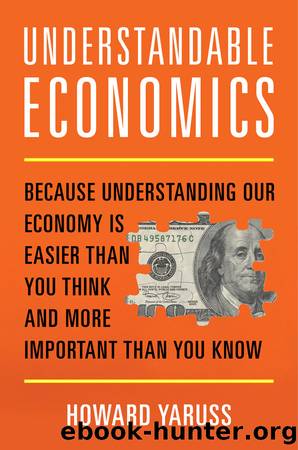Understandable Economics by Howard Yaruss

Author:Howard Yaruss
Language: eng
Format: epub
Publisher: Prometheus
Published: 2022-06-06T00:00:00+00:00
PROMOTING COMPETITION
What can be done to promote competition and prevent power from being consolidated? The first step is to recognize that many of the governmentâs own laws and policies create or exacerbate these trends.
A few of these laws intentionally and explicitly set up monopolies in order to prevent competition. For example, the government grants patents on products, such as pharmaceuticals, which give the owner of the patent a monopoly on selling that product. It grants copyrights on intellectual property, such as computer software, which give the owner a monopoly on licensing that product for others to use or enjoy. The justification for these monopolies is that we would have many fewer new inventions or products if developers were not granted a period of time where they would be the exclusive seller of what they developed. Thatâs the only way they can be guaranteed a return on the huge amount of time and money needed to invent and create new things.
Nevertheless, with regard to certain types of new products, particularly important new drugs, some restrictions on pricing seem reasonable. Patents should incent companies to develop new drugs by allowing them to charge prices that enable them to recoup the significant development costs and earn decent profits. Patents should not allow prices that enable them to earn outsize profits by taking advantage of peopleâs medical needs.
Unlike laws that intentionally create monopolies in order to encourage innovation, many laws that tilt the playing field in favor of larger, richer companies have little justification. Hypercomplex regulations, excessive licensing requirements, and convoluted tax laws that are routinely addressed by a large companyâs legal department can put a smaller company with a small or, in many cases, nonexistent legal department at a significant disadvantage.
Furthermore, our legal system gives large companies with deep pockets the ability to flood not only their competitors, but also anyone potentially standing in their way, with costly litigation. The âAmerican Ruleâ regarding legal fees provides that, in general, each party in a court case pays their own legal fees. Therefore, lawsuits are a particularly useful tactic for large companies that can access staff lawyers to sue smaller companies that often need to hire expensive outside law firms to defend them. Even if the party being sued gets the case against them dismissed or ultimately wins the case, theyâre still stuck with the legal expense of establishing they did nothing wrong. I once overheard someone asking a staff lawyer for a large company that was particularly aggressive in suing its competitors whether their job was stressful. The lawyer responded by saying, âI donât get stress. I give stress.â
Clearly, many elected representatives give lip service to the virtues of small business and often affectionately refer to them as âmom and pops.â Additionally, the federal governmentâs Small Business Administration âprovides counseling, capital, and contracting expertise as the nationâs only go-to resource and voice for small businesses.â3 Most local governments have a similar division that aims to help small business. Nevertheless, many of the laws and
Download
This site does not store any files on its server. We only index and link to content provided by other sites. Please contact the content providers to delete copyright contents if any and email us, we'll remove relevant links or contents immediately.
International Integration of the Brazilian Economy by Elias C. Grivoyannis(111059)
The Radium Girls by Kate Moore(12028)
Turbulence by E. J. Noyes(8049)
Nudge - Improving Decisions about Health, Wealth, and Happiness by Thaler Sunstein(7706)
The Black Swan by Nassim Nicholas Taleb(7129)
Rich Dad Poor Dad by Robert T. Kiyosaki(6632)
Pioneering Portfolio Management by David F. Swensen(6300)
Man-made Catastrophes and Risk Information Concealment by Dmitry Chernov & Didier Sornette(6019)
Zero to One by Peter Thiel(5802)
Secrecy World by Jake Bernstein(4753)
Millionaire: The Philanderer, Gambler, and Duelist Who Invented Modern Finance by Janet Gleeson(4478)
The Age of Surveillance Capitalism by Shoshana Zuboff(4292)
Skin in the Game by Nassim Nicholas Taleb(4248)
The Money Culture by Michael Lewis(4207)
Bullshit Jobs by David Graeber(4190)
Skin in the Game: Hidden Asymmetries in Daily Life by Nassim Nicholas Taleb(4006)
The Dhandho Investor by Mohnish Pabrai(3765)
The Wisdom of Finance by Mihir Desai(3747)
Blockchain Basics by Daniel Drescher(3583)
